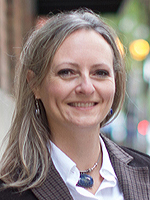Kevinwâsakâyâsiw Lewis, then talked about the teaching of teachers of indigenous languages in the University of Saskatchewan's Certificate in Indigenous Languages. He commented there was limited access to dictionaries and where most existing educational materials are from the point of view of English speakers. An additional problem is to negotiate access to information by "pipe holders" (tribal elders).
Kevin demonstrated color coding of text with animation to show tenses, or "moving morphemes". Currently this is not available as an app for the students at Saskatchewan. He is mixing students at different levels of language literacy in the one class to aid their learning.
Asked about the relevance of song in language learning, Kevin pointed out that chant and song enables the learner to stop worrying about how they pronounce. Also the repetition in the song helps learning, as well as being culturally significant. This reminded me of Dr McComas Taylor, at ANU's Teaching Sanskrit online with chanting.
References
Koole, M., & Ally, M.
(2006, April). Framework for the rational analysis of mobile education
(FRAME) model: Revising the ABCs of educational practices. In International
Conference on Networking, International Conference on Systems and
International Conference on Mobile Communications and Learning
Technologies (ICNICONSMCL'06) (pp. 216-216). IEEE. Retrieved from http://dx.doi.org/10.1109/ICNICONSMCL.2006.103

No comments:
Post a Comment